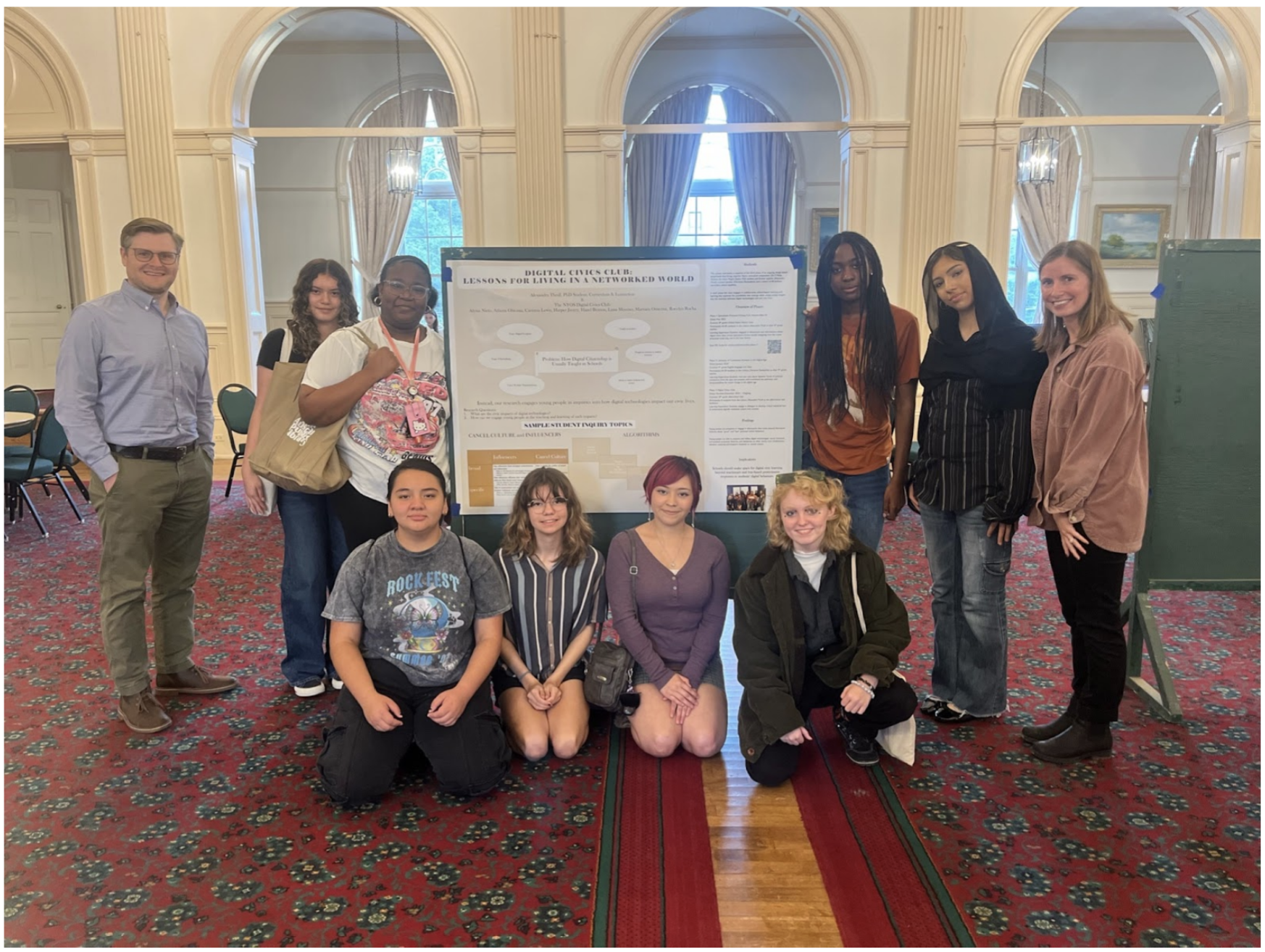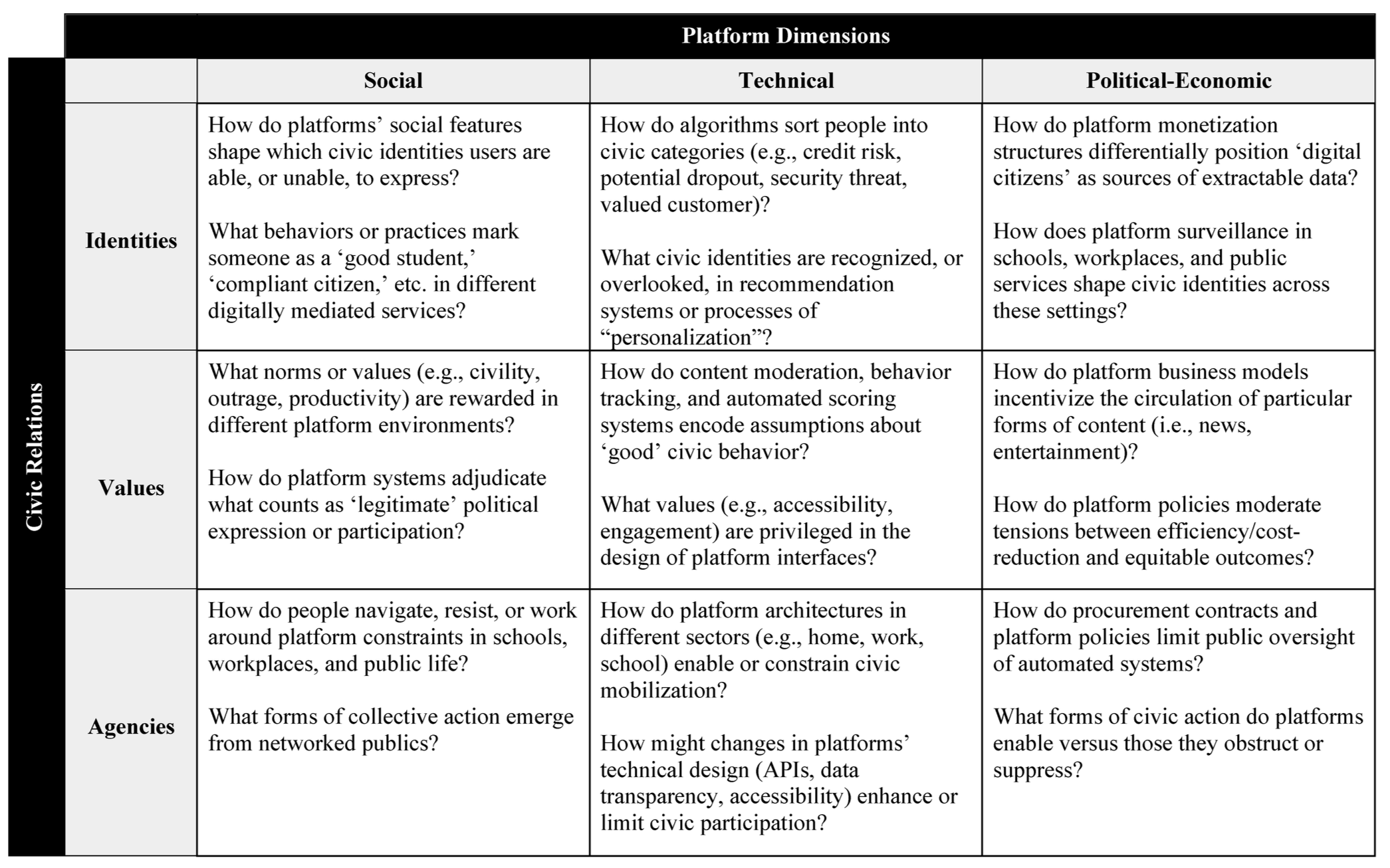Introducing Digital Civics Club
Civics of Tech Announcements
Conference Recordings: Missed a session at our 2025 conference? Head to our conference page to see if a recording is available. Please note that not all sessions were recorded. Thank you to all who made this year’s conference a rousing success!
Tech Talk on Tuesday! Join us for our monthly tech talk on Tuesday, August 5th from 8:00-9:00 PM EST (GMT-5). Join an informal conversation about events, issues, articles, problems, and whatever else is on your mind. This will be a great place to share your highlights from the conference! Register here or visit our events page.
By Allie Thrall, Phil Nichols, & Kevin Magill
How many of us imagine that we, as 10th graders, would have chosen to spend our time after school reading, writing, and discussing the issues that emerge under the umbrella of digital civics? Among the Civics of Tech community, maybe the answer is most of us. Well, we’re here to spread the good news that we would not be alone! Over the 2024-2025 school year, we offered “Digital Civics Club” as an afterschool program for 10th graders at a local high school, and were joined by a cohort of about ten students, who enthusiastically spent an hour every Friday afternoon exploring the gripping world of digital civics with us.
During the club, we critically analyzed the “trad wife” influencer trend. We related Autumm Caines’ “The Weaponization of Care” to their personal memories of ClassDojo from elementary school. We read The Propagandists’ Playbook, and were graciously joined on Zoom by Francesca Tripodi to discuss her work (much like the Civics of Tech book club). And, we presented our collaborative research at Baylor University (pictured below), to name but a few of our activities.
When asked (repeatedly, out of our general amazement with them) what motivated them to join the club, they responded with a range of answers: They appreciated the rare opportunity to discuss digital media academically. They enjoyed the space to do open-ended and creative writing. They formed personal connections with each other. And, importantly, they liked Ms. Thrall’s extravagant provision of snacks.
Digital Civics Club poster presentation at Baylor University.
The club was not entirely unprecedented. Rather, it was the extension of a longitudinal research-practice partnership that invited teachers and students from this particular school to engage with us in digital civic inquiry, guided by our curricular framework (Figure 1).
Figure 1. Digital Civic Inquiry Framework
The impetus for this work was our dissatisfaction with “digital citizenship” education in theory and in practice. While its emphasis on protecting students from cyberbullying and phishing schemes, or teaching students to fact-check online information, are certainly relevant to digital culture, this form of curriculum reduces the scope of digital citizenship to the level of the individual and their personally responsible behavior and skills. When asked about previous experiences with digital citizenship curriculum, for instance, the Digital Civics Club students recounted lectures that they perceived as intended to scare them into compliant digital behavior. While they understood that certain forms of digital engagement can pose risks to themselves and others, they agreed that these lessons excluded any exploration of the broader interplay between technology and society, and further excluded their own nuanced perspectives and experiences.
Rather than discard “digital citizenship” wholesale, digital civic inquiry attempts to revive the concept of digital citizenship, not as responsible digital behaviors and skills to attain, but as a shared political condition to examine. We take as our starting point that we are all already digital citizens by way of living in a world in which our civic relations are intermediated by platform technologies. From this perspective, we are able to approach digital civic teaching and learning as a true inquiry – bringing to students the questions that we, as teachers and researchers, are ourselves grappling with, and providing them with the space to do the same.
To support this classroom-based inquiry, we distilled insights from platform studies and civics education research into a framework, which is designed to support teachers in planning curriculum that explores the relations animated within digital citizenship’s component terms: the “digital” and the “civic”.
In considering the “digital”, our framework aims to support teachers and students in exploring, not only platforms’ immediate social uses and impacts, but also how these social dynamics are underwritten by technical dynamics (i.e. code, metadata, algorithms, interfaces, protocols, etc.) that often over-determine their social impacts, as well as by political-economic dynamics (i.e. business and ownership models, governance structures, material infrastructures, etc.) that have quite legible impacts on our civic realities.
In considering the “civic,” our framework obviates teaching and learning toward a prescribed notion of “good” (digital) citizenship. Rather, it positions teachers and students to explore how digital platforms’ intermediations already confer onto us civic identities (i.e. how we are seen and grouped), nudge and shape our civic values (i.e. our dispositions toward others and toward democratic practices and institutions), and delimit our civic agencies (i.e. if/how we register political claims).
By intersecting the “digital” and the “civic”, we have found our framework to support numerous approaches to classroom-based digital civic inquiry. While the framework provides questions at each intersection, those are intended to be demonstrative, rather than definitive. In reality, each intersection could host countless questions about our evolving digital civic relations.
The framework also allows for different approaches to curricular planning, which we have explored in our research-practice partnership.
The first year of the partnership, the Digital Civics Club students were in 8th grade, and Allie was their US history teacher. That year, Allie designed a unit for the class that invited students to write speculative fiction stories about how they imagined our digital civic relations might play out in the near future. In this unit, Allie hung the framework on the wall and wrote guiding questions at each of the nine intersections to guide classroom discussion and push the students to consider each dynamic in their writing.
The following year, we collaborated with their 9th grade ELA teacher to engage the same cohort of students in a second inquiry unit – this time on digital activism. This unit emerged from our shared reflection that the question of how to engage in effective political action amidst these (often daunting) digital civic dynamics had been challenging both for students, as well as for our research team. As such, we zoomed in on the civic agencies row of the framework to guide our planning. In this unit, students read about forms of political contention like hashtag activism, hacktivism, canceling, and technological refusal, and considered their affordances and effectiveness.
And, for their 10th grade year, Allie led Digital Civics Club for those students, who were interested in continuing this learning and collaboration. The club allowed for an open inquiry into an array of digital civic topics, as we listed above. In this environment, the framework helped to expand our analysis of each topic.
For instance, in analyzing the “trad wife” influencer trend, using the framework helped us to assess the content of their posts, in addition to the technical features, like algorithms, that promoted their content, and the business models that make their content profitable. From this perspective, we were not simply weighing in on whether or not we liked each post – while some immediately rejected the gendered tenor of the messaging, others found the images of farm life to be peaceful, and accepted the trad wives’ “personal” choices. However, in thinking about the technical and political-economic features, we found there to be a deep irony in trad wives promoting “off the grid” lifestyles with traditional gender roles, when they were broadcasting their lives using digital technologies and profiting, sometimes as the primary household breadwinner, from their messaging.
Further, the analysis did not remain at a remove from the students and their experiences, or cast normative aspirations over the discussion. Instead, students regularly drew from their insights into influencer culture and experiences following influencers to guide their understandings and pull the implications of our conversation toward self-awareness, considering: What was it about a given influencer that might make them appealing to me? How did digital civic dynamics converge for that to happen?
Although last year’s Digital Civics Club has ended, the work of Digital Civics Club continues in different forms. This year the students will take over running the club and invite participation from the broader high school community. Each of the initial student participants plan to rotate leadership and will choose topics to lead the club in exploring each week.
Additionally, some of them plan to share their insights beyond the walls of the school, which is why we are introducing the Digital Civics Club to the Civics of Tech community now! In the next week you will see blog posts from two of the Digital Civics Club students.
The first post, “Exiled on the Internet,” coming this Wednesday, is a poetic and incisive narrative, written by Athena, an aspiring writer and artist. In it, she weaves together a tapestry of digital civic issues – influence, AI intellectual property theft, screen addiction – while ultimately exploring the relationships of/between humanity and the internet.
The second post, coming next Sunday, will recount an interview that Celeste, an aspiring political scientist, conducted with EdTech Law Center founder, Andy Liddell, to learn and share about his brilliant legal advocacy work.
We hope you enjoy learning with/from these students as much as we have.

